What to Eat the Night Before a Long Run: 4 Best Meal Tips
Author:
Unlock your full potential by engaging with our experts and community! Have questions about your fitness journey or looking for expert advice on weightlifting techniques? Don’t hesitate — leave a comment below and Oleksandr Zagrebelnyi will provide a personalized answer and insights to help you reach your goals.
Torokhtiy is reader-supported. Some links are affiliate links, and we may earn a commission at no extra cost to you. See our disclosure page for details.
Are you a runner who wants to know what to eat the night before a long run? Knowing which components should be included in your pre-run meal and what things to avoid can greatly improve your overall running experience.
This blog post will tell you what to eat the night before a run and provide nutritional tips for the best possible pre-race meal plan, helping you stay energized during a long run. Let’s dive right in!
What to eat for dinner before a marathon? – During a pre-marathon dinner, runners should focus on carbohydrates as their main source of energy. Avoid fried foods and sugary snacks, due to their lack of nutrients and the fact that they can’t sustain energy during long-term exercise.
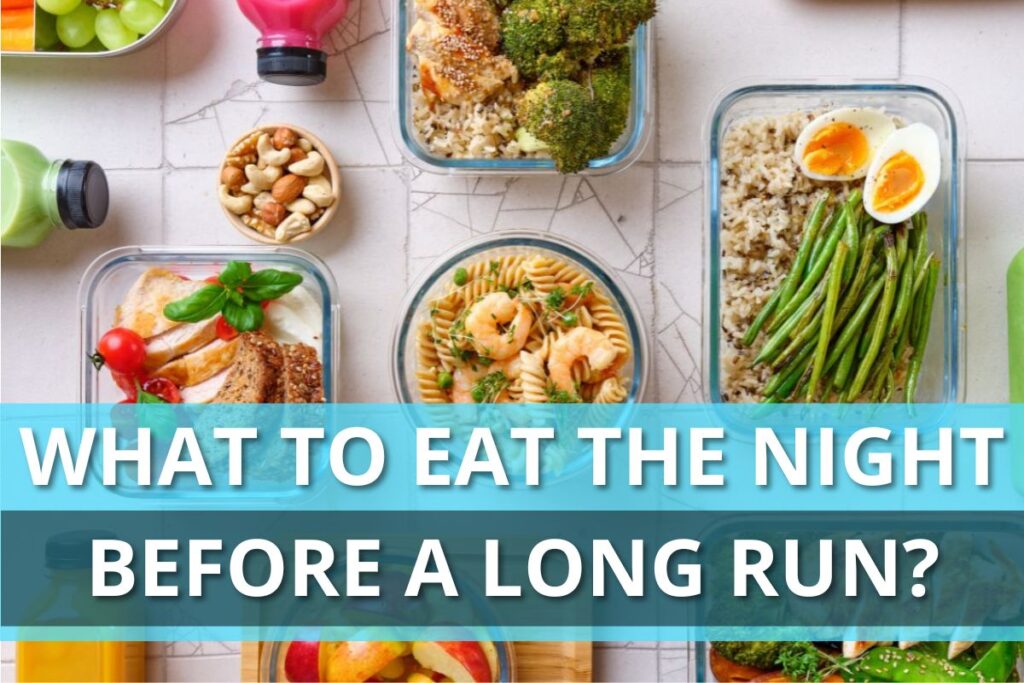
Why Nutrition Is Important for Runners?
Nutrition plays a significant role in running performance and recovery, especially for those participating in marathons or other long-distance races. For optimal performance during the race, runners need to fuel their bodies with the right nutrients.
A pre-race evening meal should include carbohydrates, protein, fats, and vitamins and minerals from all food groups. Carbohydrates provide energy for running, as well as improved mental focus and concentration.
Protein helps with muscle repair after competition while also helping runners maintain lean muscle mass. Fats help with fat oxidation during exercise, which can increase speed potential for competitive athletes over long distances.
Tips From the Champ
To get the most out of your training, it is vital to eat a well-rounded diet that includes nutrient-dense foods from natural sources rather than processed foods high in sugar and saturated fats.
Running Coach Nike Run Club Kyiv
What Should Be in the Diet of Long-Distance Runners?
Carbs, proteins, fats, and plenty of fresh fruits and vegetables are essential components of any runner’s diet, as they will help build endurance and strength. Let’s learn a bit more about what to eat the night before a race:
1. Carbohydrates
Carbohydrates are the primary source of energy for high- and moderate-intensity exercises, allowing runners to run with more power during races and training runs.
Carbs also act as an important “fuel tank,” providing a reliable fuel source that can be tapped into when needed. It is key that runners consume carbohydrates before a long run in order to ensure they get enough energy and maximize their performance.
2. Proteins
Endurance athletes need more protein than non-athletes, as it plays an important role in muscle repair and recovery and also helps support energy levels during long runs.
The recommended daily intake of protein for distance runners is between 0.5-0.7 grams per pound of bodyweight, depending on their activity level. It’s best to get most of it from low-fat sources such as eggs, fish, poultry, beans, lentils, and tofu.
If you wonder what to eat day before long run, these sources provide high-quality proteins that are better digested and absorbed by the body. They also help replenish depleted muscles right after a run or race.
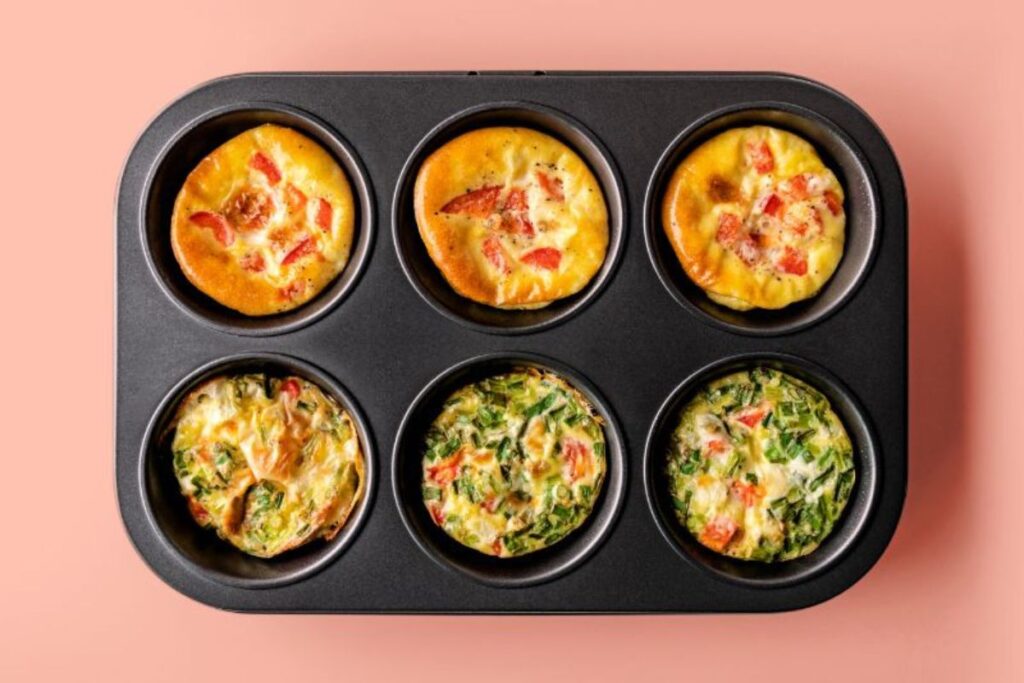
3. Fats
Long-distance runners need dietary fats to maintain energy and aid in recovery. Healthy fats should make up 20% to 25% of a runner’s total caloric intake (0.25-0.6 g per pound of bodyweight).
Examples of healthy fats include olives and olive oil, avocado, nuts (like almonds and walnuts), fatty fish (like salmon or mackerel), and nut butters (like peanut butter or almond butter).
4. Vegetables and Fruits
Consuming enough vegetables and fruits provides plenty of nutrients that runners need to stay adequately fueled. Vegetables like kale, sweet potatoes, and spinach provide iron, which helps runners build up their natural red blood cells.
They are also rich in minerals such as magnesium and zinc, which help with muscle recovery after a hard run. Fruits and veggies that are lower in fiber, such as zucchini, tomatoes, olives, and grapes, are also recommended by experts before running due to the digestion benefits they provide.
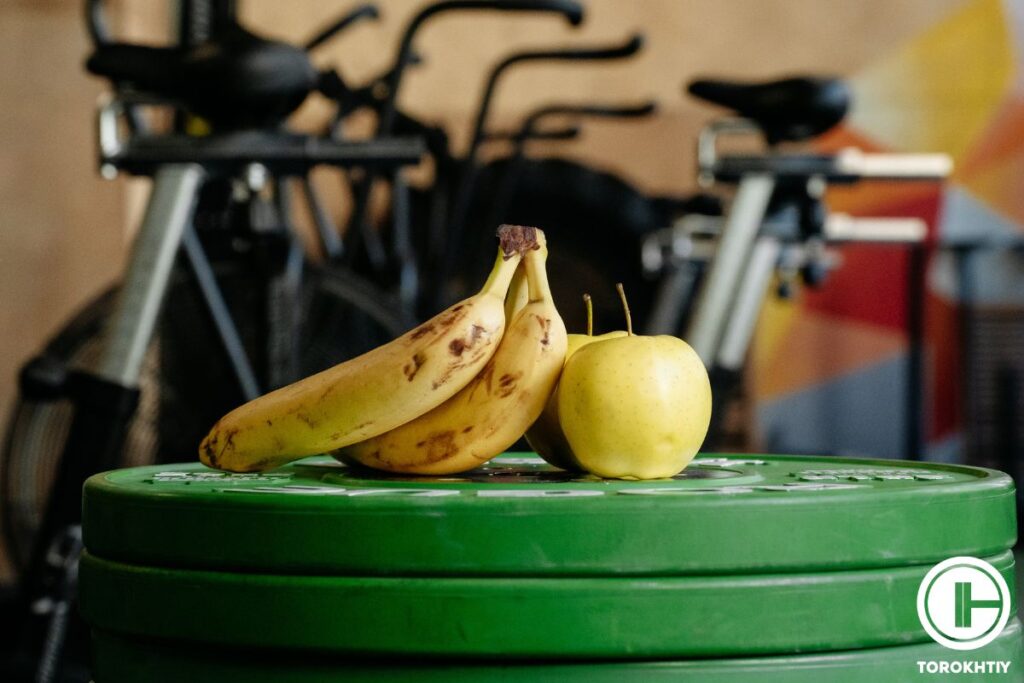
Why Runners Need Carbohydrates Before Long Runs?
Carbohydrates are essential to fuel the muscles for long runs. Athletes should pay attention to the types of carbs they consume, as there are both simple carbs and complex carbs, which can provide different levels of energy.
1. Simple Carbohydrates
Simple carbohydrates, such as sugars, play an important role in sports nutrition for runners. These simple sugars provide a fast and reliable source of energy that can be quickly absorbed into the body to provide a boost during long runs.
Since these simple carbs are easily digested by the body, they offer quick relief from hunger, without leading to discomfort or indigestion. These are a good option to consume during a run when you need short-term fuel.
2. Complex Carbohydrates
Complex carbohydrates are created by linking together sugar molecules, providing a slow-release source of energy that can last throughout the duration of a long run.
Examples of complex carbs include oats, quinoa, barley and bran, all of which are excellent sources of nourishment on the night before a big run. Other sources include whole grains such as whole-wheat pasta and breads, both of which contain fiber and B vitamins that improve metabolism and reduce fatigue during extended exercise periods.
Meal Plan for the Night Before a Long Run
A pre-marathon dinner should include a balanced mix of proteins, fats, and complex carbohydrates to ensure enough energy for the upcoming run. Here are four of our favorite ideas:
1. Salmon Pasta and Asparagus
Salmon provides a lean source of healthy protein, while pasta is an excellent complex carbohydrate, and also offers B vitamins. Asparagus contains Vitamin A and C, along with B6 and folate, which support healthy muscle tissue growth.
This combination gives long-distance runners the energy they need to complete a long effort without feeling sluggish or fatigued.
- Serving size: 380g
- Calories: 460
- Carbs: 68g
- Fat: 13g
- Protein: 17g
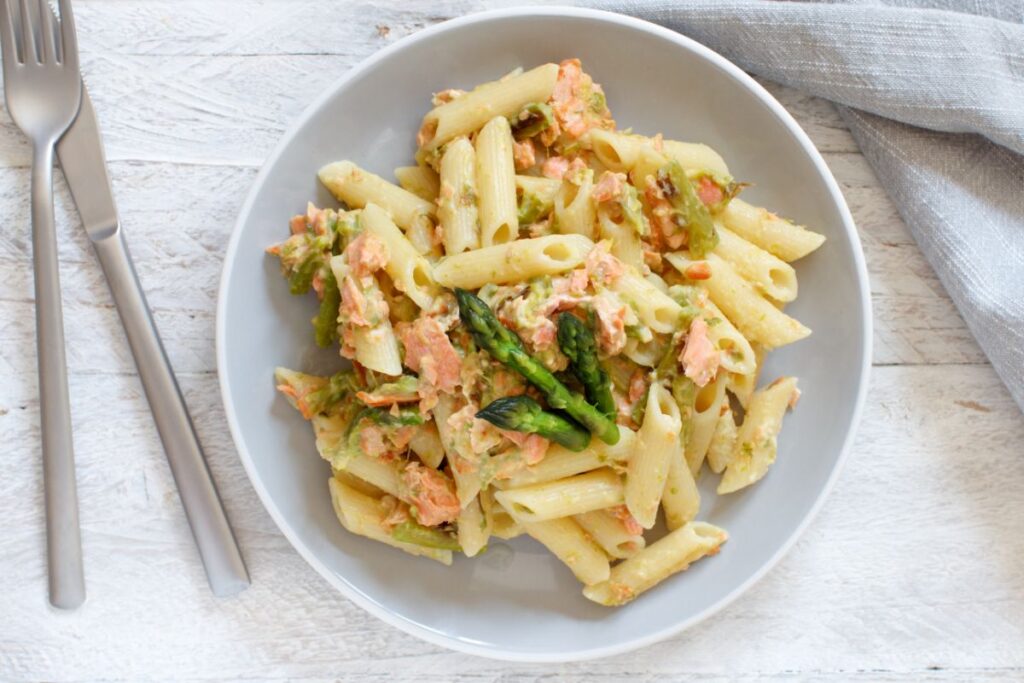
2. Chicken Sandwiches
Chicken sandwiches are one of the best meal the night before long run due to their balance of carbohydrates, lean protein, and healthy fats. Chicken sandwiches with whole-grain bread provide a substantial amount of complex carbs, which provide a slow release of energy throughout your run.
In addition to being high in B vitamins like niacin, thiamine, and B6, chicken is an excellent source of lean protein, which can help promote muscle health before a run and aid with recovery afterward.
- Serving size: 2 sandwiches
- Calories: 360
- Carbs: 44g
- Fat: 11g
- Protein: 18g
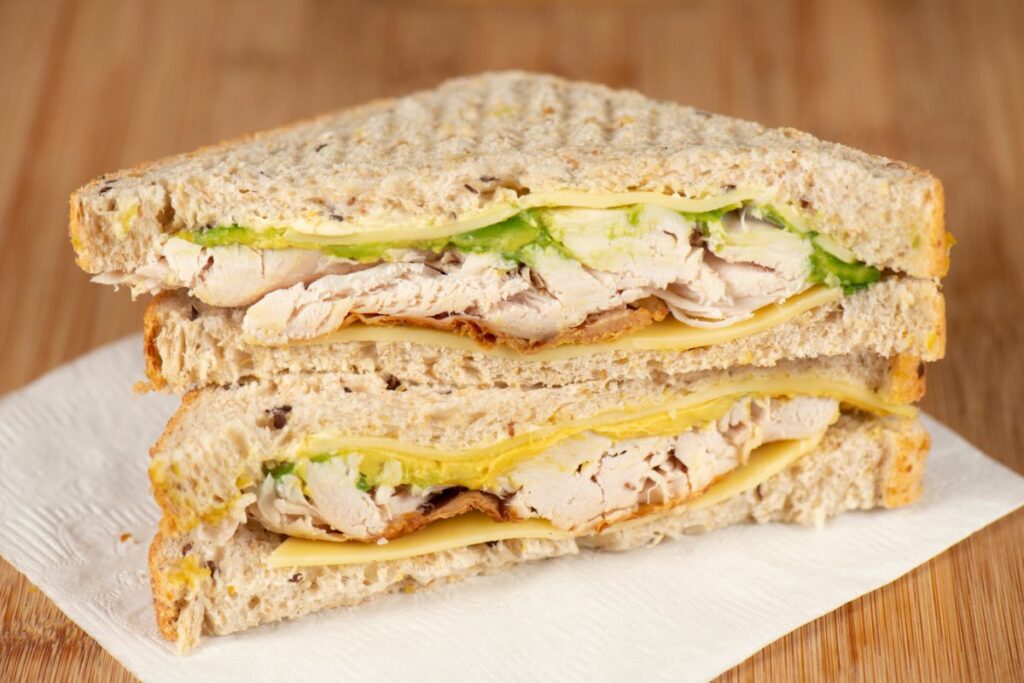
3. Steak and Grilled Veggies
Full of protein, B-vitamins, and complex carbohydrates, this meal provides sustained energy to fuel your run the following day.
Enjoy lean cuts, like sirloin or flank steak, with vegetables such as bell pepper, zucchini, carrot, or broccoli for maximum nutritional benefits.
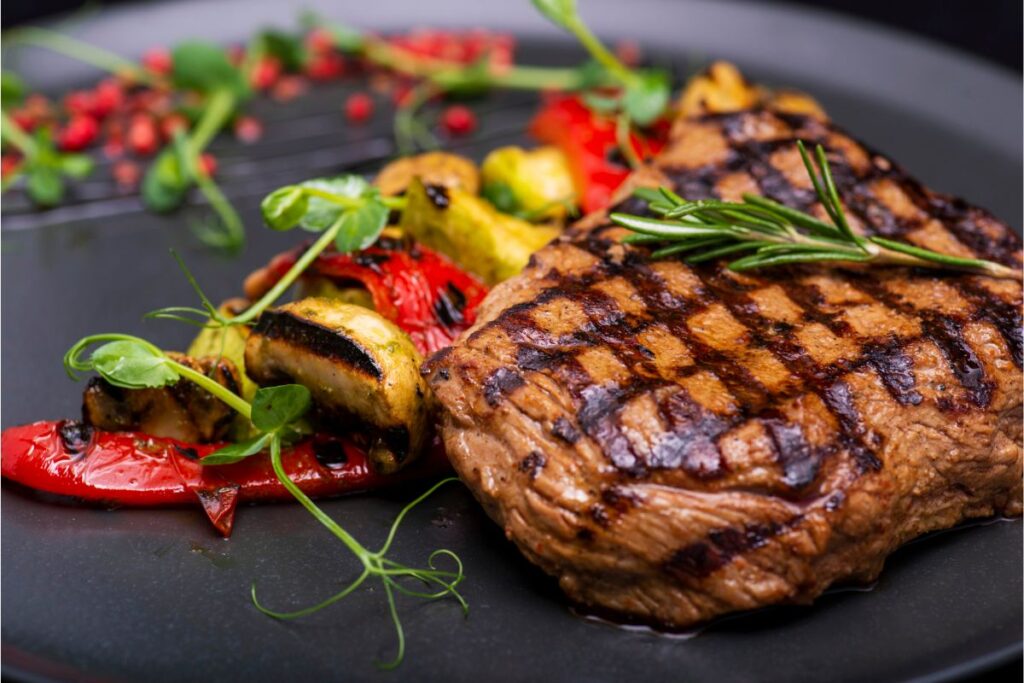
- Serving size: 283g
- Calories: 258
- Carbs: 12g
- Fat: 8g
- Protein: 35g
Tips From the Champ
Be sure to season lightly with herbs and spices, while avoiding added salt. Slice up steak into smaller portions after grilling in order to aid digestion before you hit the pavement.
Running Coach Nike Run Club Kyiv
4. Cereal and Fruits
Fruits are rich in vitamins, minerals, and antioxidants, which provide a powerful combination of good nutrition for optimal running performance. Complex carbohydrates such as cereals contain fiber, which helps improve digestion for more sustainable energy during an endurance race.
Eating cereal and fruit together helps to increase the meal’s nutritional value and provides long-lasting fuel, which is essential for any long-distance runner. Furthermore, this type of pre-run meal is easily digestible, so it won’t leave you feeling weighed down on marathon morning.
- Serving size: 1 cup
- Calories: 200
- Carbs: 35g
- Fat: 3.5g
- Protein: 7g
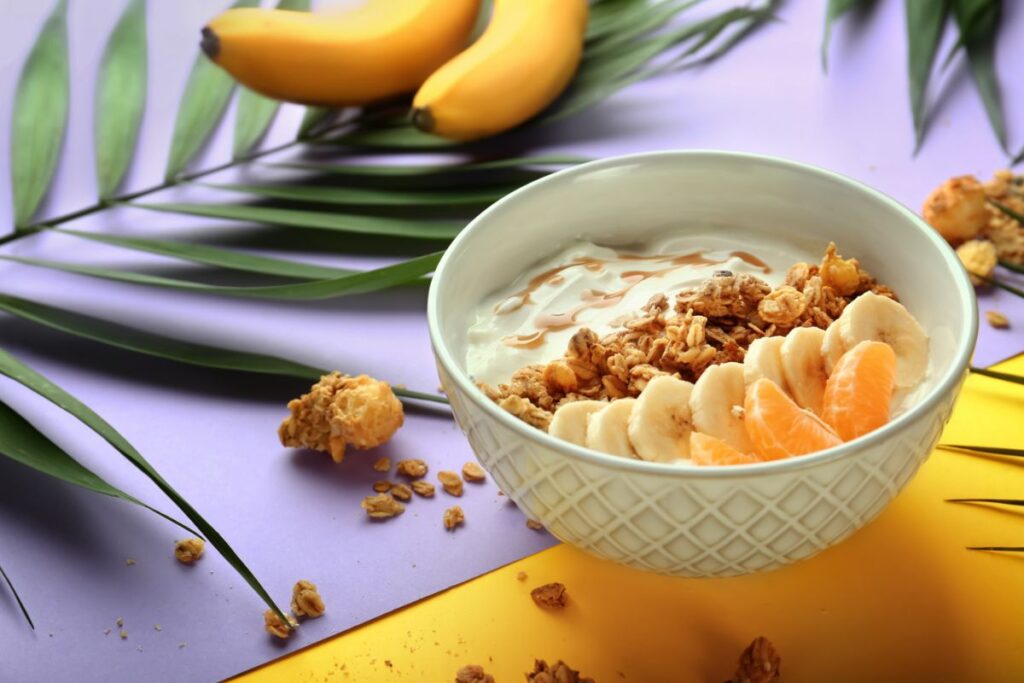
What to Eat Before a Run in the Morning?
Now that you know what to eat the night before a half-marathon, let’s discuss some pre-run breakfast options:
1. Complex Carbs
A breakfast rich in complex carbs is recommended before running, since they release energy over a longer period of time compared to simple sugars.
Tips From the Champ
Long-distance runners should consider including complex carbs such as oats, brown rice, quinoa, sweet potatoes, barley, and buckwheat in their breakfasts for optimal performance during a race. Be sure to mix carbs with some healthy fats, like avocado or coconut oil, to increase the amount of energy you get during the run.
Running Coach Nike Run Club Kyiv
2. Lean Proteins
Lean proteins like yogurt and eggs can be great food choices for runners who are looking to make sure they have enough energy before a long run. These protein sources provide essential nutrients and energy and promote muscle building.
Tips From the Champ
Greek yogurt is particularly beneficial, because it provides around double the amount of protein compared to regular yogurt. It also contains slow-digesting carbohydrates that help keep energy levels stable throughout your run.
Running Coach Nike Run Club Kyiv
Egg whites are rich in quality proteins and relatively low in calories. They help rebuild muscles without adding any extra weight to carry along on your journey.
3. Hydrating Foods
To maintain proper hydration levels, it is recommended to include hydrating foods in the pre-run meal. Foods with high water content, such as fruits, vegetables, and berries, can provide an excellent source of energy during the run and also help prevent dehydration.
Tips From the Champ
Fruits like grapes, watermelon, peaches, and grapefruit contain lower amounts of fiber, so they are easier to digest before runs than more fibrous options.
Running Coach Nike Run Club Kyiv
What Not to Eat the Night Before a Long Run?
It is important to avoid some types of foods before running a long distance:
1. Legumes and Beans
Legumes and beans like chickpeas, lentils, peas, kidney beans, and black beans should be avoided the night before a long run, as they are high in fiber. This type of food can cause gastrointestinal discomfort during a marathon or other race, or even just an intense workout session.
The fiber found in legumes may not have sufficient time to digest, which could lead to digestive issues (such as bloating) on your run day morning. Consuming any high-fiber foods before a long race or run can be detrimental to a runner’s performance, as it can result in gastrointestinal issues.
2. High-Fat Foods
High-fat foods can slow down digestion and cause discomfort during a run. Fatty foods such as cheese, peanut butter, and similar snacks take longer to digest and can slow down a runner during a tough marathon or long-distance event.
Tips From the Champ
It is generally best to avoid eating fatty foods before running, especially within three hours of starting. These types of food tend to stay in our system for much longer, causing stomach upset during a run.
Running Coach Nike Run Club Kyiv
3. Spicy Foods
Eating spicy cuisine, like Thai curries or Mexican tacos, can cause uncomfortable gastrointestinal issues during a race, resulting in stomach discomfort and an inability to focus.
Additionally, these high-fat and often carb-heavy meals are not ideal pre-race nutrition choices and tend to require more energy to digest. This might result in slowing you down on marathon day or leaving you feeling sluggish instead of energized.
4. Sugary and Carb-Heavy Foods
High levels of sugar in the bloodstream can cause an initial burst of energy, but this is generally followed by a “crash” or extreme fatigue during the run itself. Runners should focus on consuming lean proteins and complex carbohydrates, while avoiding sugary drinks or desserts that could lead to dehydration or weaken their immune system.
What Other Tips Do You Need Before a Long Run?
In addition to eating before a long run, having the right mixture of snacks and fluids on hand can help fuel your race and assist with post-run recovery.
1. Snacks
Snacks provide a vital source of fuel and energy before, during, and even after a long run or race. They should contain digestible carbohydrates that can be quickly absorbed by your body so you have instantly available fuel for maximum efficiency when running.
2. Hydration
When running long distances, it is important to ensure proper and adequate hydration. By drinking 8 ounces of water or energy drink every half hour during a run, runners can stay ahead of dehydration and prevent fatigue.
Tips From the Champ
Increasing fluid intake in the days leading up to a race or long run will also help ensure that your body is fully prepared for race day. On race day, make sure you consume 17 to 20 ounces of water with your pre-run meal.
Running Coach Nike Run Club Kyiv
Hoka Bondi 8
- Material: Breathable and supportive mesh upper
- Sole Material: Full-length EVA midsole for maximum cushioning
- Outsole (tread feature): Durable rubber outsole with a unique lug pattern
- Drop: 4mm
- Season: Suitable for all seasons
- Special Features: Exceptional cushioning and comfort
- Size: Available in various sizes
- Type: Maximum cushioning running shoe
If you want excellent running or walking shoes or just footwear you’ll be comfortable in, you can’t go wrong with the Hoka Bondi 8.
It’s been upgraded and now they have lighter, softer materials and a new extended heel design. The heel design gives a super soft, balanced feeling from th emoment your heel hits the ground to when you push off with your toes.
As far as the weight goes, it’s around 10.80 ounces, and the heel drop is 4 mm. They’re not too heavy and the lower drop is a good balance between cushioning and feeling connected to the ground.
The Bondi 8 is focused on cushioning and keeps things simple. There’s a good amount of support without any extra stuff that you don’t really need and that would only jack up the price. Take the rear crash pad, for example – it makes for a soft, smooth ride, which is perfect if you like to run outdoors.
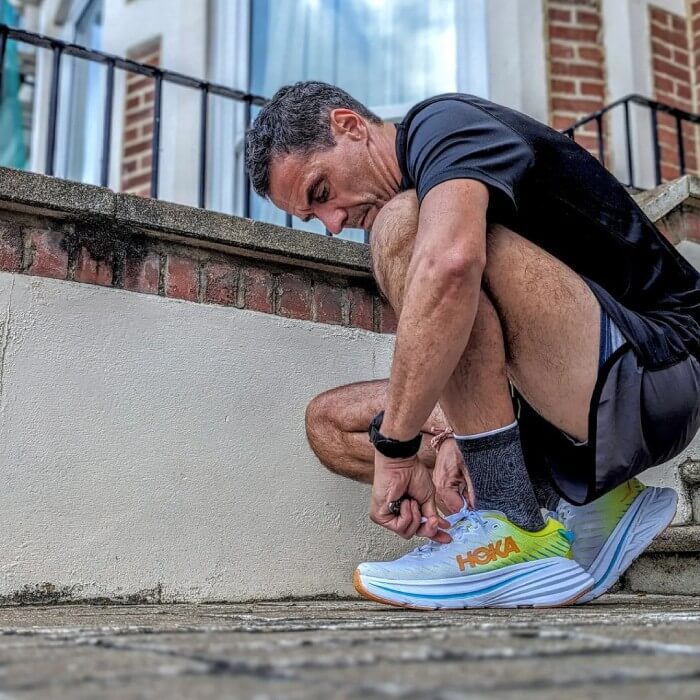
The upper part is made of engineered mesh, which is breathable and keeps your feet cool and dry. The tongue and collar have memory foam and mold to your foot shape. All of these features make the fit snug but flexible, which is exactly what you would want.
The Bondi 8 is eco-friendly because it uses recyclable materials in parts like the mesh and the sockliner. Plus, the shoes are completely vegan, which (if that’s important to you) is nice!
FAQ
How Much Should I Eat the Night Before a Long Run?
The night before a long run, runners should eat a moderate-sized meal rich in carbohydrates, with lower amounts of protein and fat. The recommended daily amount of carbohydrates is 3-5 grams per pound of body weight, 3 or 4 days prior to the race.
What Should I Do the Night Before a Big Run?
It is especially important to have good rest and a healthy dinner the night before a big run. Make sure your pre-race nutrition includes complex carbohydrates for optimal performance. As you plan out the night-before meal, it is good to avoid sugary drinks and energy drinks that provide empty calories.
Conclusion
The night before a long run is an important time to focus on nutrition. It is essential to fuel the body for endurance and performance, focusing on carbohydrates as the main source of energy.
Protein should also be included in the pre-run meal, but it’s important to select lean protein sources such as eggs, fish, and poultry, and to avoid high-fat content in general. Fried foods and sugary refined carbs should be avoided, as these foods are non-nutritious sources of calories.
Eating well the night before a long run will ensure better performance, so taking some time for careful meal planning beforehand can really help you reach your goals.
What is your best food to eat night before a race? Please share your ideas in the comments below.
References:
- Kato H, et al. Protein Requirements Are Elevated in Endurance Athletes after Exercise as Determined by the Indicator Amino Acid Oxidation Method. PLoS One. 2016 Jun 20;11(6):e0157406. https://journals.plos.org/plosone/article?id=10.1371/journal.pone.0157406
- Chad M. Kerksick, et al. (2018) ISSN exercise & sports nutrition review update: research & recommendations, Journal of the International Society of Sports Nutrition, 15:1, https://www.tandfonline.com/doi/full/10.1186/s12970-018-0242-y
- Parnell JA, et al. Dietary restrictions in endurance runners to mitigate exercise-induced gastrointestinal symptoms. J Int Soc Sports Nutr. 2020 Jun 10;17(1):32. https://www.tandfonline.com/doi/full/10.1186/s12970-020-00361-w
- Louise M. Burke et al. Contemporary Nutrition Strategies to Optimize Performance in Distance Runners and Race Walkers. International Journal of Sport Nutrition and Exercise Metabolism. Volume 29: Issue 2 https://journals.humankinetics.com/view/journals/ijsnem/29/2/article-p117.xml
- Orzeł D, et al. Comparison of vegetables and fruit consumption frequency by athletes before and after marathon. Rocz Panstw Zakl Hig. 2018;69(3):267-272. http://wydawnictwa.pzh.gov.pl/roczniki_pzh/download-article?id=1245
- MedlinePlus. Simple carbohydrates. https://medlineplus.gov/ency/imagepages/19534.htm
- Photos by baseimage, Canva; Foodie Factor, Pexels; katrinshine, Canva; RobertDowner, Canva; Ruslan Khmelevsky, Pexels; pixelshot, Canva.
Why Trust Us?
With over 20 years in Olympic weightlifting, strength training, nutrition coaching, and general fitness our team does its best to provide the audience with ultimate support and meet the needs and requirements of advanced athletes and professional lifters, as well as people who strive to open new opportunities and develop their physical capabilities with us.
By trusting the recommendations of our certified experts in coaching, nutrition, and sports training programming, as well as scientific consultants, and physiotherapists, we provide you with thorough, well-considered, and scientifically proven content. All the information given in the articles concerning workout programming, separate exercises, and athletic performance, in general, is based on verified data.
The product testing process is described in more detail here.
Oleksandr is a running coach and member of the Nike Run Club coaching team for 8 years. A participant in national and international competitions at distances from one kilometer to the ultra trail. Owner of mountain trail running camps. Nowadays Oleksandr is responsible for creating running training programs for athletes of various levels, coaching personally offline and online, conducts trail running camps in the mountains, participates in competitions.



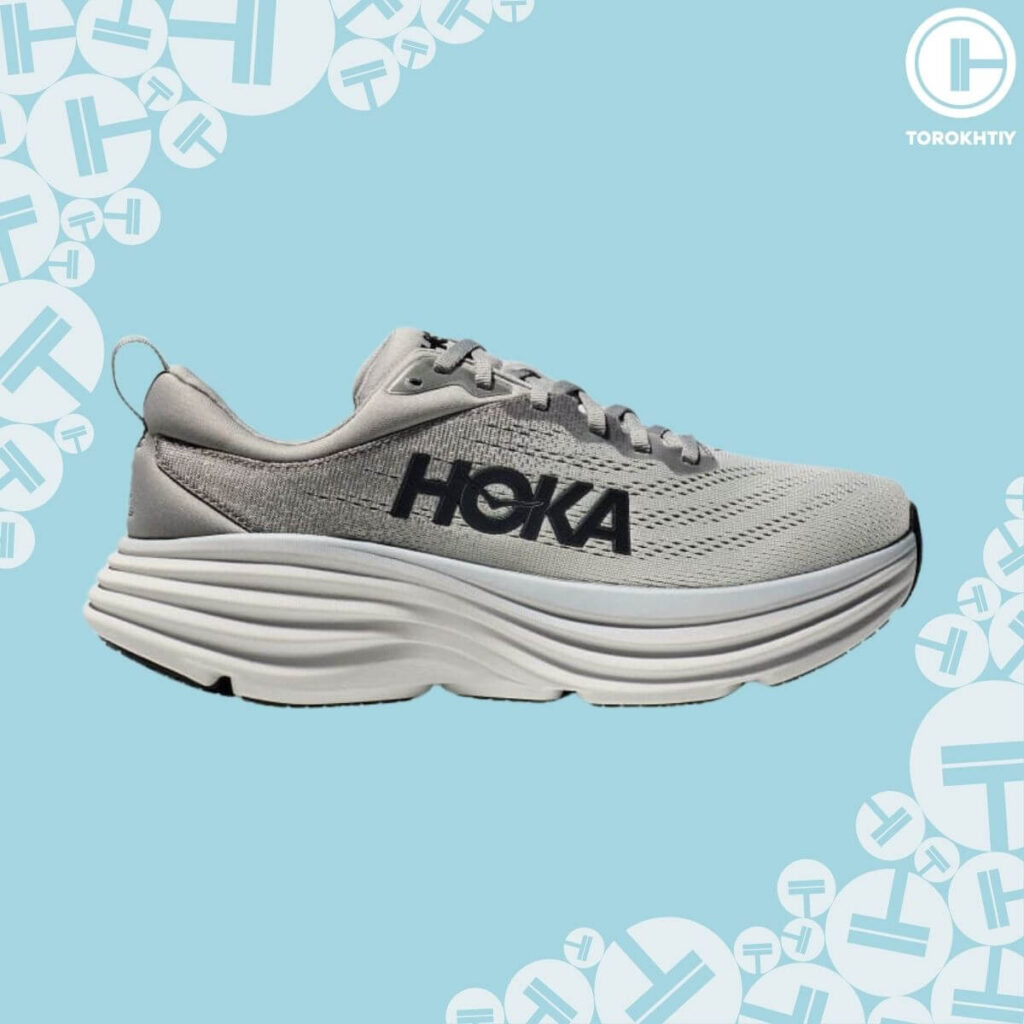
Still have questions after reading our article? Unlock your full potential by engaging with our experts and community! Don’t hesitate — leave a comment below and Oleksandr Zagrebelnyi will provide a personalized answer and insights to help you reach your goals.